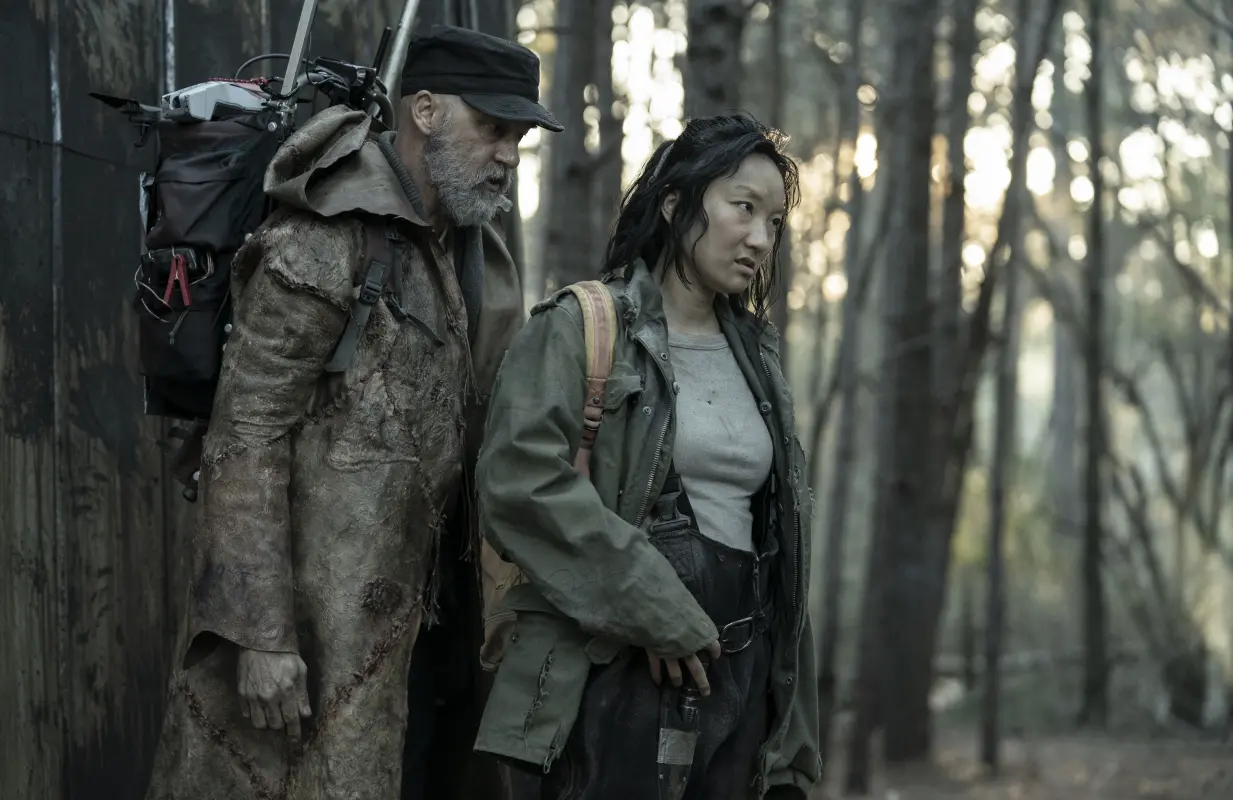Tales of the Walking Dead Made a Zombie Story Beautiful
-
 Anthony Edwards and Poppy Liu in Tales of the Walking Dead (Photo: Curtis Bonds Baker/AMC)
Anthony Edwards and Poppy Liu in Tales of the Walking Dead (Photo: Curtis Bonds Baker/AMC)Spoilers ahead for Episode 4 of Tales of the Walking Dead.
Zombies are always a metaphor for something. Hordes of undead former people tend to be a great stand-in for collective behaviors, from rampant consumerism to unchecked rage to the way we film everything in our lives. And understandably, this symbolism is almost always dark. It's hard to imagine flesh-eating monsters representing anything lovely about humanity.
Until this Sunday, at least. With the episode "Amy/Dr. Everett," AMC's anthology series Tales of the Walking Dead arguably delivered television's most beautiful zombie tale.
That's not to say it's G-rated. Like every other installment of the show, which features standalone stories about characters both new and familiar to the Walking Dead universe, this one is filled with gore. But the first things we see are images of nature. Animals frolic in the woods while Dr. Everett (Anthony Edwards) narrates a film he's making about the environment's remarkable recovery after humans were essentially wiped out by zombies. (Or homo mortis, as the doctor calls them.) In his telling, the walkers are now apex predators who have reduced human beings to prey, and the world is better for it.
This is fascinating philosophical territory. Do these brain-sucking beasts symbolize the best of us? Is the suggestion that the world is better off if we're reduced to our basic instincts to hunt and feed?
But not so fast. If the good doc truly believed that, he'd run out and let himself get chomped in the neck. The fact that he's obsessively tracking a group of walkers instead, tagging them and following them like a marine biologist would a dolphin pod, complicates the metaphor.
So does Amy (Poppy Liu), who crashes into the doctor's observation zone and almost kills one of his favorite specimens while she's trying to save herself. After he rescues her, they get locked in a debate about the best way forward. Should they hang back and celebrate humanity's absence, or should they try to find more people? The rest of the episode is driven by this tension — the value of watching the world versus the value of belonging to it.
Depending on how you tilt your head, the walkers symbolize both sides.
On one hand, we discover that Dr. Everett learned to love the zombies after one of his best friends got turned. Presumably, he started looking closer because his buddy had joined their ranks. Perhaps the walkers represent all the so-called monsters we could appreciate if we just sat still and paid attention to them.
On the other hand, we're reminded that in Walking Dead world, zombies travel in bigger and bigger packs, teaming up until they eventually make huge swarms. That's not so different, really, from the community of survivors that Amy is so desperate to rejoin. Maybe the roaming hordes of walkers also embody our bone-deep need to be part of something.
From that perspective, it's not exactly sad when, at the end of the episode, Amy becomes a zombie herself. No matter how painful her last human moments might have been, there's no denying that she's part of an even bigger community now. Plus. she's part of the new species that Dr. Everett cares about so much.
Both symbols are valid at once: By this point in the episode, the walkers embody both the unlikely beauty of a world we fear and the beckoning call of a tribe. That tension is evident in the episode's final image, when Dr. Everett stares at zombie-Amy directly in the eyes. There's danger there, and sadness, but there's also a sense that both of them have reached a purer version of themselves. He will always be watching, and she will always be moving with the pack.
Is this all of us? Are we all Everett and Amy at the same time, watching some worlds and belonging to others? Is the point somewhere in the middle of these two extremes?
The episode doesn't tell us what to think. It does, however, include a voiceover of Dr. Everett, who narrates Emily Dickinson's poem "Nature is what we see" over his latest footage. "So impotent Our Wisdom is," he quotes, "To her Simplicity."
In other words, we can't outsmart the world. We can just exist inside it, feeling our hungers and hoping to sate them.
New episodes of Tales of the Walking Dead premiere Sundays at 9:00 PM ET on AMC through September 18.
Mark Blankenship has been writing about arts and culture for twenty years, with bylines in The New York Times, Variety, Vulture, Fortune, and many others. You can hear him on the pop music podcast Mark and Sarah Talk About Songs.
TOPICS: Tales of the Walking Dead, AMC, Anthony Edwards, Poppy Liu
- Every Single Show in The Walking Dead Universe, Ranked From Worst to Best
- Tales of the Walking Dead Creators Are Planning a Musical Episode
- The Walking Dead Universe Expands With New Trailers, Andrew Lincoln and Danai Gurira Spinoff
- Tales of the Walking Dead crew member injured in after-hours on-set accident